
IN THIS ISSUE
“Slalom — A Local Growth Story (Pioneering a New Model),” Tony Rojas, CEO, 2DC/Slalom | Opener | Kindering Grant | Sparkle Dollars and the Minister of Fun | Classification Talk: Dustin Walling | New Member Project: Saturday, August 27th
THIS FRIDAY'S PROGRAM
“Accessing Capital: Business Survival Tips from the Great Recession,” Mike Flynn, who was at the helm of the Puget Sound Business Journal for 24 years, retiring in 2006. He has moved to what he refers to as his “entrepreneurial encore” of consulting, counseling and advising businesses, business people and business organizations. He currently writes a weekly column, Flynn’s Harp, an email that reaches about 1200 business people and elected officials. His focus and commitment relate to building business relationships, whether bringing business leaders of different regions together, bringing start-up entrepreneurs in contact with those who have capital to invest, or helping rural areas grow through creating contacts with expansion-minded businesses. For both start-up and mature companies, the challenge of accessing capital to grow and survive has seldom been greater than what has occurred during this economic downturn. There is a new paradigm for everything from venture and angel investing to traditional finance vehicles like banks and investment firms. Mike will provide some anecdotes about interesting people and their role in the financial drama. [Prater/Holert]
THOUGHT FOR THE WEEK
“The biggest human temptation is to settle for too little.” ~ Thomas Merton, author and Trappist Monk
BIRTHDAYS
ANNIVERSARIES
PHOTOGRAPHER
WWW.SNOPES.COM
Real or Hoax?
FRIDAY SNAPS

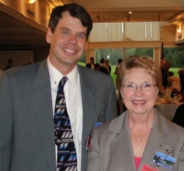
Glen Foster & Lee Smith
President John opened the meeting with a special welcome “auf Deutsch” (in German) to our new exchange student.
“Guten morgen, BBRC! Wie geht es ihnen? Wilkommen, unser Austausch Shuelerin von Garbsen in Deutschland. Wir freuen uns sehr, dich hier bei uns zuhaben. BBRC, bitte alle aufstehen und hallo sagen.”

Steve Szirmai
Steve Szirmai also stood up and demonstrated his command of the German language with his special intro of our nex exchange student.
Lee Smith provided the invocation and led the pledge. New member Glen Foster introduced visiting Rotarians and guests.

Jane Kuechle
Community Service Director Jane Kuechle introduced special guests from the Kindering Center. She reminded the club that as part of the 10K event, both Children’s Hospital and the Kindering Center were partners to receive significant BBRC grants. Kindering CEO Mimi Siegel represented the organization and provided a special thanks to the BBRC for our donation of $12,000.

Cole Hardman
Accompanying Mimi to the meeting was Cole Hardman. Cole was born prematurely and wasn’t expected to live past age two. He is legally blind, has a congenital spinal disorder called spina bifada, and is severely hearing impaired. He spent the first nine months of his life in Children’s Hospital. After he came home, he spent a few years in foster care with a family who knew how to care for medically fragile children, going home to his own family only on weekends.
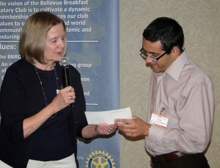
Jane Kuechle & Cole Hardman
At age one, he started attending Kindering, where he learned to eat (he’d been fed through a feeding tube up until then). There, he also learned to crawl, then walk, and begin to catch up. Without that nurturing and care during his first three years of life at Kindering, he would not be the young man he is today, a college graduate with a full time job and living independently. Cole feels he owes his adult success to the therapies he received at Kindering in his very early life. To quote Cole, “With the right attitude, you can achieve anything.”
Sparkle Director Wendi hit the club with a pop quiz on Rotary knowledge.
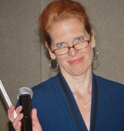
Minister of Fun Wendi Fischer
- What are the Five Avenues of Service?
- Within those areas of Service, Rotary has six areas of focus. What
- are they?
- Where is the newest Rotary peace center located?
- What is the focus of August?
- How many Rotary clubs are there in the world?
- How many Rotarians are there in the world?
- Who is the current District Governor?
- Who is the District Governor-Elect?
- Bonus: Who is your favorite Sergeant At Arms?
Those with the sparkle stars on their name tags were spared the fines; those who didn’t know the answers paid either one or two dollars, based on their scores.
How would someone learn all those Rotary answers and avoid future fines? Hint: Those who are recent District 5030 Rotary Academy grads seemed to have a distinctive leg up on the competition.

Dustin Walling
Dustin was raised with three first names: Oops, Dammit, and Dustin. Oops became his name when his mother became pregnant seven years after the youngest of his five older brothers was born. Dammit was the name as the frustrated father would cycle through the names of the six brothers, who all had DRW initials, in order to address the appropriate child. Partway through each time, he’d become flustered and resort to “Dammit, get over here.” Dustin became Dammit.
Dustin’s lovely wife is a native of India, and her last job was translating German to English.
Dustin is a principal of the firm Dustin Walling Associates. Their tag line is “Helping execute initiatives others give up on.” They focus is involved in strategy development.
In closing, Dustin reminded the club of the New Member Project next Saturday.
The new member hands-on rehab project will be this Saturday from 8:00AM to 4:00PM at the Salsbury Court, 10023 NE 20th St, Kirkland. There is still a need for an extension ladder, a volunteer with a pick-up, and about 10 more volunteers to pitch in and help.
Contact Dustin Walling or Girish Bhatia if you can volunteer your ladder, pick-up, or time!
“Slalom — A Local Growth Story (Pioneering a New Model),” Tony Rojas, CEO, 2DC/Slalom

Tony Rojas
Kaj Pedersen introduced the guest speaker, Tony Rojas, President of the holding corporation for two highly successful businesses, Slalom and Two Degrees. His message was to bring awareness of how these two companies became successes in our own back yard.
Tony is a WSU grad, and he is proud to call the Pacific Northwest his home.

Kaj Pedersen
Slalom Consulting started as a spin-off division of Two Degrees. It focuses on business and technology consulting. He emphasized that the two companies are simply two different brands of one holding company.
In 2002, that company grossed $13 Million, and was located only in Denver and Seattle. Tony came to the company after 12 years of working directly for Bill Gates.
When Tony came to this company, he led its new strategic vision. He studied the Fortune 1000 companies, and where they were headquartered. His company was in the West, and they were primarily along the eastern seaboard. Tony’s decision was that they needed to geographically branch out for better coverage. That move has increased their income to between $275 and $280 Million.
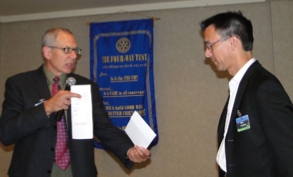
President John Martinka thanks Tony Rojas for his program.
The success involved pioneering a new business model: Take the best of the big four consulting companies and marry that with what was missing. Tony recounted how the biggest in the business, Deloitte, flew people around too much. There was too much down time on the plane. Also, they discovered that the rhythm and cultures of business are different in different places. His conclusion: Get people off the road.
For market positioning, their niche is helping with strategic execution — not the underlying strategy, but how to execute once the foundation is laid. They can project manage for you.
At the end of his discussion, Tony unveiled a new iPhone app that his company is about to release for Group Health. It’s the only one in the nation like it. From an iPhone, patients can sign in, read all their health records, work with an interactive symptom evaluation tool, find appropriate Group Health facilities, and even do online appointment scheduling.
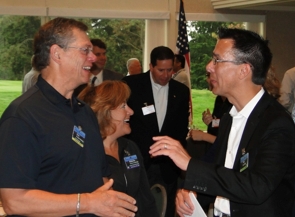
Norm Johnson talks with Tony Rojas after Friday's meeting.
Who does his company work with? Apple, Hyatt, United, Microsoft, Boeing, eBay, Gap Macy’s, and a myriad of other notable names.
Their company has been showered with numerous prestigious awards. In 2010, they were named Microsoft Partner of the Year. They also recently received the Glassdoor.com award, a coveted honor based entirely on employee satisfaction.
Looking ahead, by 2015, they project annual revenues will be at $500 Million, they will have 2000 employees, and they will “own” the local business model in their industry in the US. All of this will be accomplished with less than 10% of their employees traveling for business.




